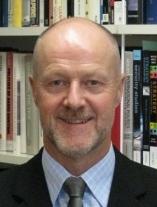Dr Trevor Findlay - Unleashing the Nuclear Watchdog
On Tuesday 21 February, our guest at Glover Cottages was Dr Trevor Findlay, distinguished Melbourne nuclear academic and chair of the UN Secretary-General’s Advisory Board on Disarmament Matters. His current research focuses on global nuclear governance, including the International Atomic Energy Agency (IAEA).
Dr Findlay outlined the origins and growth of the IAEA, and its twin and somewhat contradictory functions of encouraging the growth of global nuclear power on the one hand, and inhibiting the development of nuclear weaponry on the other. Although it has endured well beyond the halcyon days in the 1950s when nuclear energy was seen as an all-embracing panacea, the Agency has suffered from several problems. Among them is its limited annual budget. This has remained static at around $US 520 million per annum with total resources of $US736 million. About one third of this is devoted to the inspection of many of the world’s reactors by 250 IAEA qualified inspectors, barely enough to do the job, and some of them are regularly seduced by higher-paid jobs elsewhere in the industry.
Second, the Agency has to compete for jurisdiction and international attention with a multiplicity of other agencies, including the UN Security Council, other UN agencies, EURATOM and other minders of the Nuclear Non-Proliferation Treaty.
Third, the Agency’s remit has been limited until very recently to dealing with governments, not the international corporations driving the growth in construction of nuclear power stations around the world. Now it does, with some of them.
Not that there has been much growth since the three Fukushima Dai-ichi reactor melt-downs in March 2011. Dr Findlay observed that with a couple of exceptions, Japan’s nuclear fleet remains shut down, formerly enthusiastic customers for reactors like Vietnam and Indonesia seem unlikely to proceed with plans to build them, and several European countries have curtailed or limited reactor-generated electricity production. Capital costs and prudential risk are the main inhibitors. Overall, the number of operating nuclear power generating reactors around the globe is shrinking towards the 400 unit mark. This has not stopped nuclear reactor manufacturers in Russia, the UK, Japan, France and South Korea from continuing vigorously to advocate reactor construction, nor gung-ho nuclear nations like India and the United Arab Republics from proceeding with their nuclear energy programs.

Dr Findlay said that the Additional Safeguards Protocol negotiated after discovery of a clandestine and deceitful nuclear weapons program in Iraq in the early 1990s had marginally strengthened the Agency’s capacity to make sudden and intrusive inspections of nuclear facilities, but problems remained. Among them is the retiring, somewhat introspective personality of the Agency’s Director General, Yukiya Amano. Amano was caught flat-footed as the Fukushima disaster unfolded in 2011, and he had to be quite bluntly persuaded to go and see what the Agency could do to advise and help. His standing among senior Japanese officials is not particularly high. However, Amano is now standing for a third term as director general, which he will probably get.
Dr Findlay commented briefly on the advent of Donald Trump. His fierce opposition to the agreement inhibiting Iran’s nuclear program is puzzling and probably will not succeed in destroying it. His determination to defund UN bodies in general is an ominous development for the IAEA. His earlier suggestion that Japan (among other nations) should develop its own nuclear weapons, since modified but not absolutely reversed, could precipitate nuclear weapons proliferation in North Asia. The Agency, concluded Dr Findlay, has its work cut out.
Report by Richard Broinowski